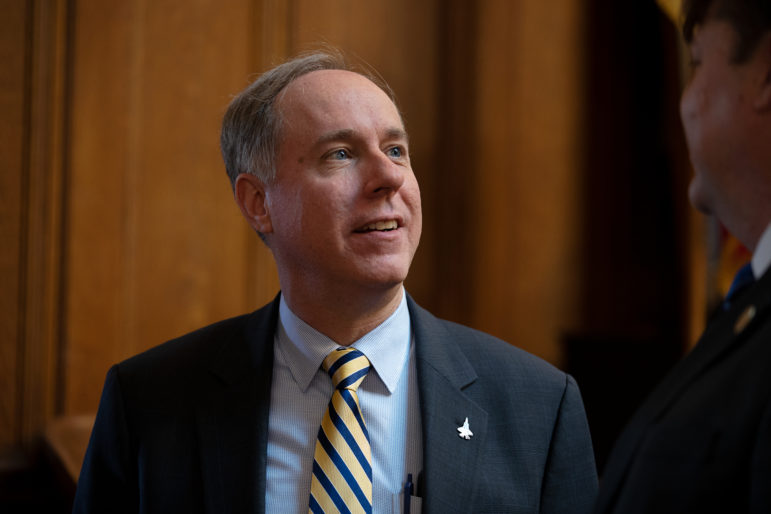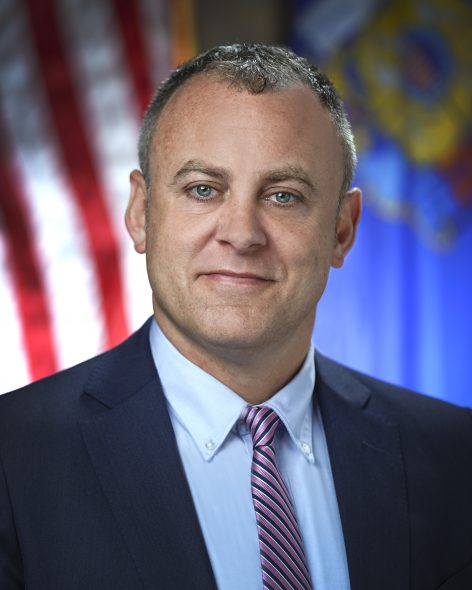Robin Vos ‘Selling Out Democracy’?
Hintz looks back at four years as Assembly minority leader and how Republicans ‘lost their way.’

Assembly Speaker Robin Vos. File photo by Coburn Dukehart / Wisconsin Center for Investigative Journalism.
Gordon Hintz has carried the Democratic banner in the state Assembly as leader for the last four years, but he first joined the body in 2007, which gave him just one session under full Democratic control. So like any other Democrat who fought back against the Republican agenda under former Gov. Scott Walker, the Oshkosh representative has been in the trenches during an intense political “moment” in Wisconsin history which has actually lasted for more than a decade.
Monday is his last day as minority leader for Assembly Democrats. On Tuesday Rep. Greta Neubauer (D-Racine) takes over as leader of the caucus.
Being in a minority party where gerrymandered districts offered little hope of becoming a majority, despite Assembly Democrats routinely getting far more votes statewide than Republicans, can be disheartening. That makes the minority leader part resistance leader, part cheerleader. And with a soft-spoken governor who is less visible than many of his predecessors, much of the pushback against the policies of Republicans has fallen on Hintz.
Even so, his role has not entirely been opposition to Republicans — Hintz says he and Speaker Robin Vos have found cause to commiserate over the difficult burdens of caucus leadership, discussing how to bring a team of elected leaders with strong opinions together. He sums up the difference between minority and majority leadership power as, “The speaker has more sticks, I have more carrots” and adds that, “I think you’re always better to try and get someone to come along for the right reasons than you are trying to bully them in any way.”
Hintz has watched Vos, who’s been speaker for more than a decade, change dramatically over just the past several years, starting when Republicans lost statewide offices to Gov. Tony Evers and Attorney General Josh Kaul and he chose to start off those relationships with a lame duck session grabbing power away from those incoming Democrats. He sees that as the first step on the path to the current political situation where many Republicans still push the “Big Lie” that the election was stolen.
“Starting with the lame duck session in Wisconsin, it demonstrated a new place that they were willing to go,” says Hintz. “There were so many things that happened in the Walker years that I thought were terrible, bad for the state and inconsistent with our long-term legacy as a state — Act 10, school privatization, voter ID, right to work, attacks on reproductive health — but those were all policies. This went to a new place. This said we’re willing to change the powers of the governor and attorney general who were elected to use those powers, before they even started.
“I think that’s sort of a precursor to just how far they’re willing to go now. They are going to try to give themselves the power to administer the elections and overturn the results of an election if they don’t like them. The speaker is pretty clearly the leader of the Republican Party for now and I think you lose your way when you start dismantling the infrastructure of our country. You realize how fragile democracy is.”
Vos is dealing with a caucus that is moving increasingly to the far right — providing clear proof, says Hintz, of how the Republican Party has changed under Trump. He’s seen GOP representatives who Hintz humorously dubs “Waukesha Chamber of Commerce types” replaced by “full QAnon” reps. His conclusion is not that Vos began to buy into QAnon conspiracies or truly thinks that Trump won the 2020 election. Rather, he says it shows “just how far they are willing to go to hold on to and expand power.”
Hintz says it’s hard to believe Gableman was ever a Supreme Court justice, describing him now as “one of the Jan. 6 guys” and his review as “producing lies, buffoonery and a waste of taxpayer money.”
All legislative Republicans should be held accountable for caving to “a cult-like figure” in Trump, says Hintz. He particularly faults Vos.
“The speaker is willing to go along with it because he sees the end game,” says Hintz. “He has a high threshold for selling out democracy. I don’t think people have hit the speaker enough for this.”
In the end, Hintz does not expect any concrete result from the partisan election investigation.
“They’ll never come up with a report because they can’t,” he says of the Gableman/Vos “audit.”
“They can’t because it will have to stop short of putting Trump back in office. People need to understand what’s happening here. That’s not democracy — it’s a new place they are going away from much of our recent history of peace and prosperity … and the speaker is willing to use double talk and keep going on down that road.”
Low point: Unfair maps
“It’s hard to tell where rock bottom is,” Hintz says of the attacks on elections and democracy. If he had his way, every single Republican legislator would be forced to answer the question: “Do you support partisans being allowed to discredit or overturn our election results?”
After months of battling the extremism, conspiracy theories and outright lies about the election, the low point for Hintz came when the Wisconsin Supreme Court indicated it was “going to use criteria for which there is no precedent as a way to justify reinforcing the current map” for redistricting. That said, he plans to keep up the fight for fair maps.
Every election period Hintz hears Republicans telling their constituents that they support nonpartisan redistricting — then turning around and voting for gerrymandered maps. He asserts: “Policy will be out of line with where the public is so long as you allow gerrymandered maps.”
So it’s no surprise that were he handed a magic wand to make one change in legislative government, Hintz says he’d use it to “get fair maps, competitive maps reflective of the real breakout of the people of the state.”
High note: Gov. Evers
Democrats complain about how little the Evers administration communicates with them or includes them in governing. Yet Hintz says having Gov. Tony Evers in the east wing of the state Capitol has been the highlight of his years in leadership.
As an example, he points to Evers allocating federal pandemic relief funds for education, economic development and other causes after Republicans passed a stripped-down budget, cutting much of what the governor wanted to see allocated for schools. He adds that Evers is doing everything he can to keep Wisconsinites safe during the pandemic, despite a GOP push to block his public health measures while spreading anti-vaccine and anti-mask rhetoric.
And like most Democrats Hintz praises Evers for his “vetoes on culture war issues, reproductive issues, voter suppression” and other extreme GOP measures sent to him by the Legislature:
“Gov. Evers is the only thing keeping us from freefall.”
Nature of the beast…err, job
Hintz says the hardest part of being the minority leader is internal caucus dynamics and “getting people to recognize what wins look like, what success looks like and the best way to lose.” It’s never easy, he says, walking into a floor session knowing that no matter how hard you try or what you do, Republicans will not change their votes and things Democrats strongly oppose will pass. “You have to define what is the best version of how today can go.”
While those days are hard, making it tough to maintain your idealism, “you gotta keep the fire burning and find value in your work.” Part of that job, says Hintz, is to keep letting your constituents know what kinds of measures Democrats support so voters know what the agenda would be like with Democrats in full control.
Hintz cites some bipartisan legislative accomplishments and says he hopes the rest of the session, which ends in March, will include the advancement of bipartisan work on criminal justice reform and clean water initiatives, among other bipartisan bills. He also sees potential to agree on and pass measures raising the age to buy tobacco to 21 (this has passed the Assembly but not the Senate), eliminating cash bail, responding to the labor shortage, altering the rules for retired teachers to return to teach in schools and authorizing drivers’ licenses for undocumented residents.
When Sen. Howard Marklein (R-Spring Green), who co-chairs the powerful Joint Finance Committee, sent his new year letter to constituents Friday, he included raising the age on tobacco and addressing labor shortages on his priority list, although he pointed in particular to prison staffing. Marklein also mentioned broadband modernization, another area both parties can likely find agreement.
In an pre-session interview with WisPolitics, Vos also echoed Hintz in his willingness to address bail issues, saying he wants to keep “hardened criminals” from being released on bail, but adding, “I don’t want to use bail as a de facto prison sentence.”
And proving the two — while clear political opponents — enjoy some comradery, in mid-December when Hintz announced his intention to step down as leader, Vos had the following response, “I’ve enjoyed working with Gordon over the last four years. While we don’t agree on policy we certainly share a love for the state of Wisconsin and a desire to see growth and prosperity for all the people that make it such a great place.”
“Serving in a leadership position demands a significant amount of time and I respect his decision to focus on his family,” Vos continued. “I wish him the best of luck and look forward to continuing to work with him in the Assembly.”
Hintz reflects on his time leading Democrats into legislative battle was originally published by the Wisconsin Examiner.























Vos is a snake.
Rino? No. 4th Reicher? More liker.